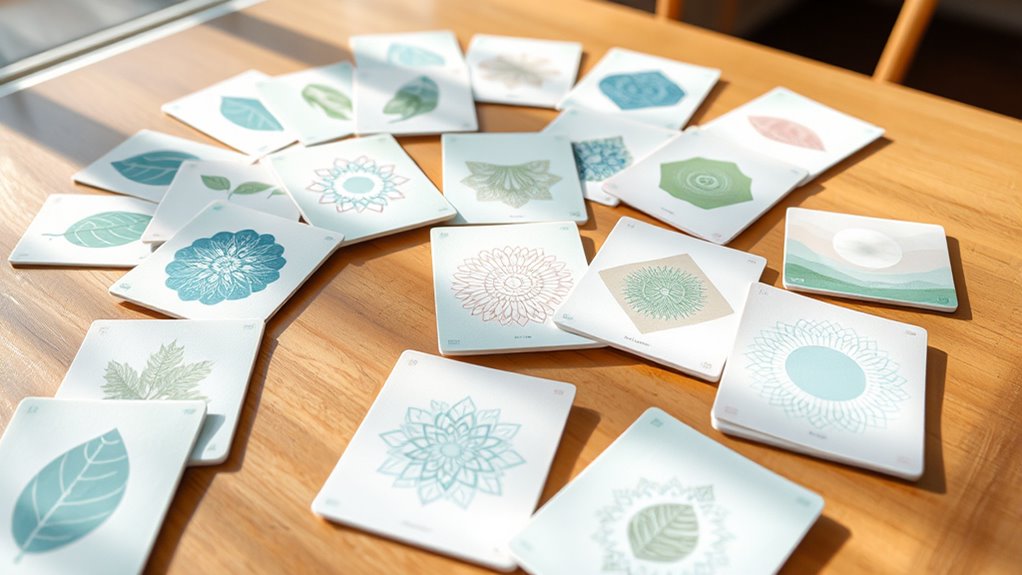If you’re looking for the 15 best mindfulness card games to stay present and relaxed, I recommend options like QUOKKA Rethink 95 Affirmation Cards, Mind Brain Emotion stress scripts, and QUOKKA Meditation Cards for adults. There are also prompts like the BEST 100 Mindful Prompts and engaging games like Shined Mind, perfect for all ages. These cards combine engaging design with proven techniques. Keep exploring to find the perfect fit for your mindfulness journey.
Key Takeaways
- High-quality, visually appealing decks like QUOKKA Meditation and Mindfulness Games promote relaxation and present-moment awareness.
- Cards offer diverse exercises such as breathing, visualization, and affirmations suitable for all ages and settings.
- Portable and durable designs make these card games ideal for on-the-go mindfulness practice.
- Many decks include categorized prompts to foster self-reflection, emotional regulation, and stress relief.
- Evidence-based content and engaging layouts enhance relaxation and help users stay present in daily life.
QUOKKA Rethink 95 Affirmation Cards for Mental Wellness
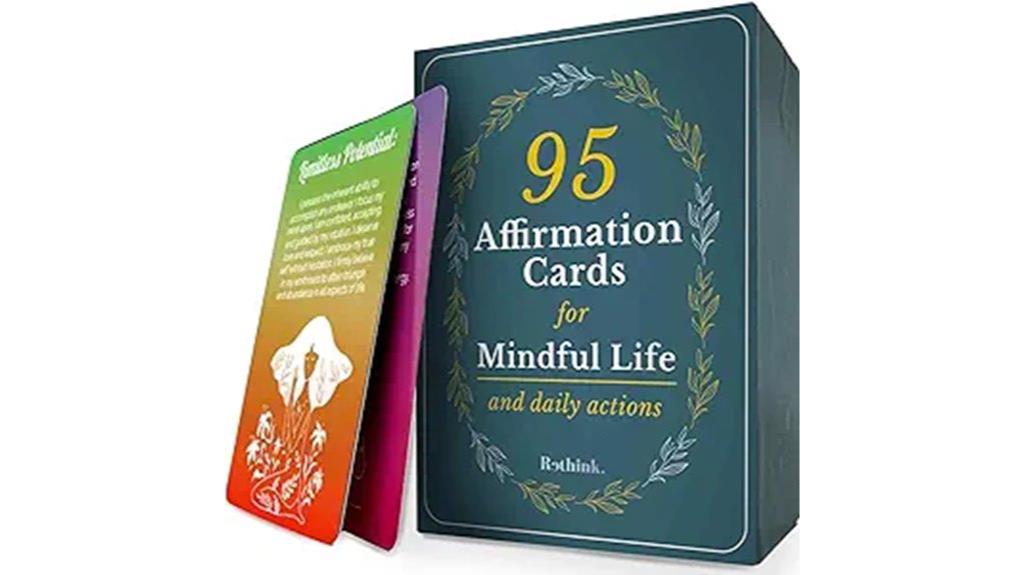
If you’re looking for a practical way to boost your daily mental wellness, the QUOKKA Rethink 95 Affirmation Cards are an excellent choice. These high-quality cards feature vibrant graphics and elegant designs, making them both visually appealing and durable. Each card offers a unique message that encourages self-love, confidence, and emotional well-being. They’re versatile and can be used for journaling, self-care routines, or group discussions. Many users find them helpful for reducing stress and fostering mindfulness. Packaged in a sleek box, they make thoughtful gifts for friends or family. Overall, these affirmation cards are a simple, effective tool to promote positivity and mental clarity every day.
Best For: individuals seeking daily mental wellness support, self-care routines, or thoughtful gifts to promote positivity and emotional well-being.
Pros:
- High-quality, durable cards with vibrant graphics and elegant design
- Versatile for journaling, group discussions, or personal reflection
- Highly rated with 4.7 stars, praised for aesthetic appeal and meaningful content
Cons:
- Small font size (approximate size 8/9), which may be difficult for some users
- Affirmations are somewhat verbose and not explicitly action-oriented
- Limited information on customization options or additional features
Mind Brain Emotion 52 Coping Skills Cards for Stress and Anxiety

The Mind Brain Emotion 52 Coping Skills Cards are an excellent choice for anyone seeking practical, evidence-based tools to manage stress and anxiety. Developed by Harvard researchers, this deck offers over 50 psychologist-approved exercises rooted in mindfulness, CBT, and somatic practices. They’re perfect for teens, adults, and school settings, helping improve emotional regulation, focus, and resilience. The cards are portable, durable, and discreet, making them easy to use anywhere. Whether as a therapy aid, group activity, or personal routine, users report benefits like reduced anxiety, enhanced social skills, and better decision-making. They’re a versatile, effective resource for fostering emotional well-being and self-confidence.
Best For: individuals seeking practical, evidence-based tools to manage stress, anxiety, and improve emotional resilience in personal, educational, or clinical settings.
Pros:
- Contains over 50 psychologist-approved mindfulness, CBT, and somatic exercises for effective stress relief
- Portable, durable, and discreet design suitable for use anytime and anywhere
- Versatile for therapy, group activities, personal routines, and self-care practices
Cons:
- Some users report the cards are less thick and durable compared to standard playing cards
- Limited to 52 cards, which may not cover all personalized coping strategies or needs
- May require guidance or familiarity with techniques for optimal use, especially for younger users
QUOKKA Meditation Cards for Adults
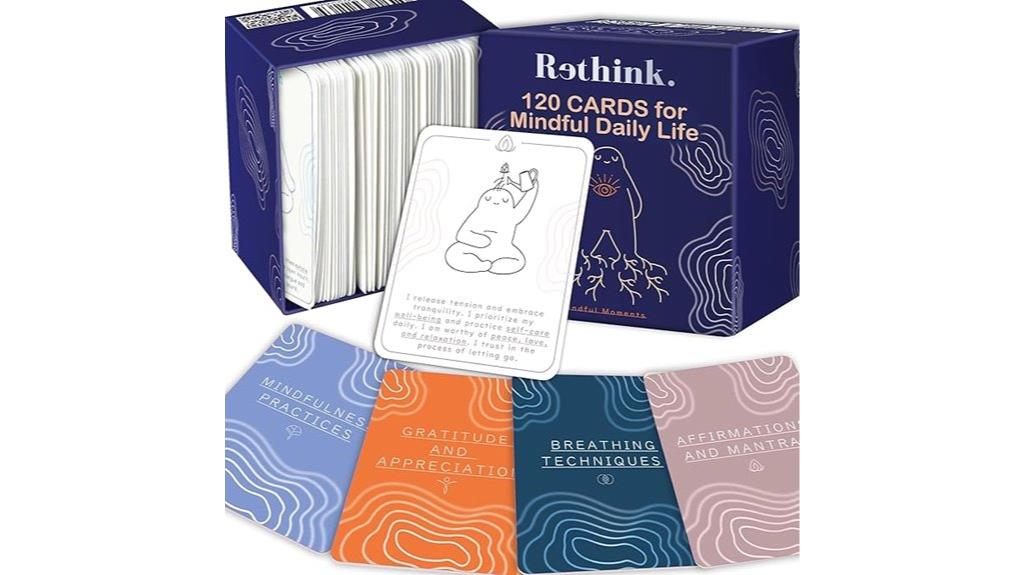
Designed specifically for adults seeking stress relief and mental clarity, QUOKKA Meditation Cards offer a simple yet effective way to incorporate mindfulness into daily routines. With 120 beautifully illustrated cards across categories like breathing techniques, affirmations, mindfulness practices, and gratitude, these cards provide practical guidance to relax and refocus. They’re perfect for personal use, group therapy, or as thoughtful gifts. Many users find them helpful for reducing anxiety, reframing negative thoughts, and fostering emotional balance. Compact and visually appealing, the cards make meditation accessible and enjoyable, helping you cultivate a calmer, more centered mindset every day.
Best For: adults seeking effective tools for stress relief, mindfulness, and emotional well-being in personal, group, or professional settings.
Pros:
- Offers 120 beautifully illustrated, easy-to-use cards covering various mindfulness and self-care categories
- Promotes relaxation, anxiety reduction, and mental clarity through practical meditation prompts and affirmations
- Compact, visually appealing design makes it suitable as a thoughtful gift or daily self-care routine
Cons:
- May be less suitable for children or teens under 15 due to the recommended age range
- Some users might prefer more interactive or digital meditation tools for variety
- The physical cards could become worn over time with frequent handling
BEST 100 Mindful Prompts for Self Care & Stress Relief
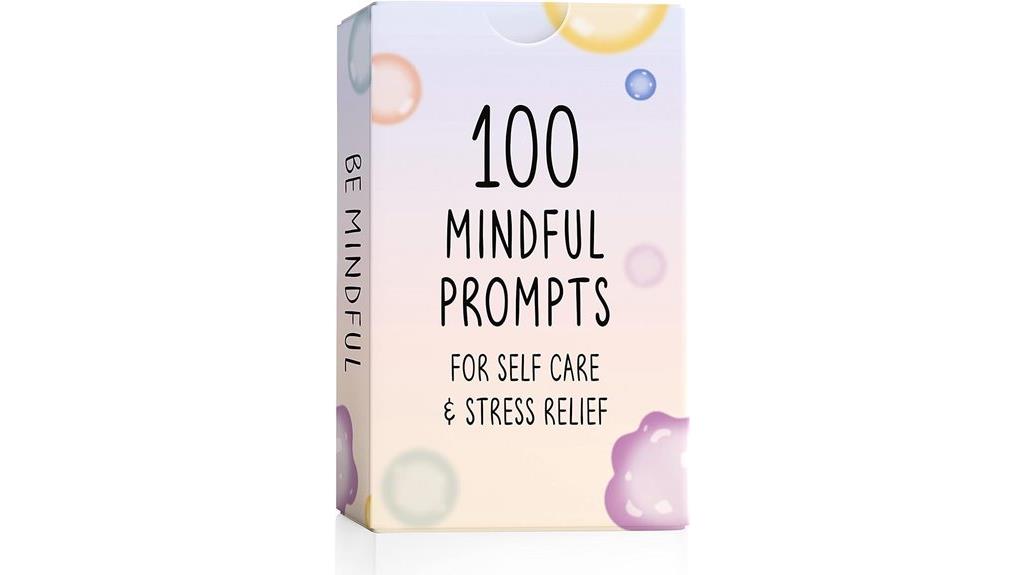
These mindfulness card games are an excellent choice for anyone seeking quick, meaningful prompts to reduce stress and boost emotional well-being. The “Best 100 Mindful Prompts for Self Care & Stress Relief” feature 50 double-sided cards with diverse categories like Mindfulness, Emotions, Stoicism, Zen, and The Idea Space. They’re perfect for daily routines, offering inspiring quotes, reflection questions, and challenges that promote relaxation, emotional awareness, and mental resilience. Compact and visually appealing, these cards can be used at home, work, or on the go. They make thoughtful gifts and are suitable for all ages, encouraging ongoing self-care and personal growth.
Best For: anyone seeking quick, meaningful prompts to reduce stress, enhance emotional well-being, and foster self-care in daily routines for all ages and lifestyles.
Pros:
- Provides diverse categories like Mindfulness, Emotions, and Zen to promote holistic self-improvement
- Compact and portable design makes it easy to carry and use anywhere
- Attractive, durable cards suitable for display, gifting, or social media sharing
Cons:
- Some users may find the size smaller than expected for handling or reading comfortably
- Price-to-quality ratio may vary, with a few reviews mentioning it could be more affordable
- Occasional variability in prompt quality might affect the consistency of experience
Mindfulness Therapy Games for Kids, Teens & Adults
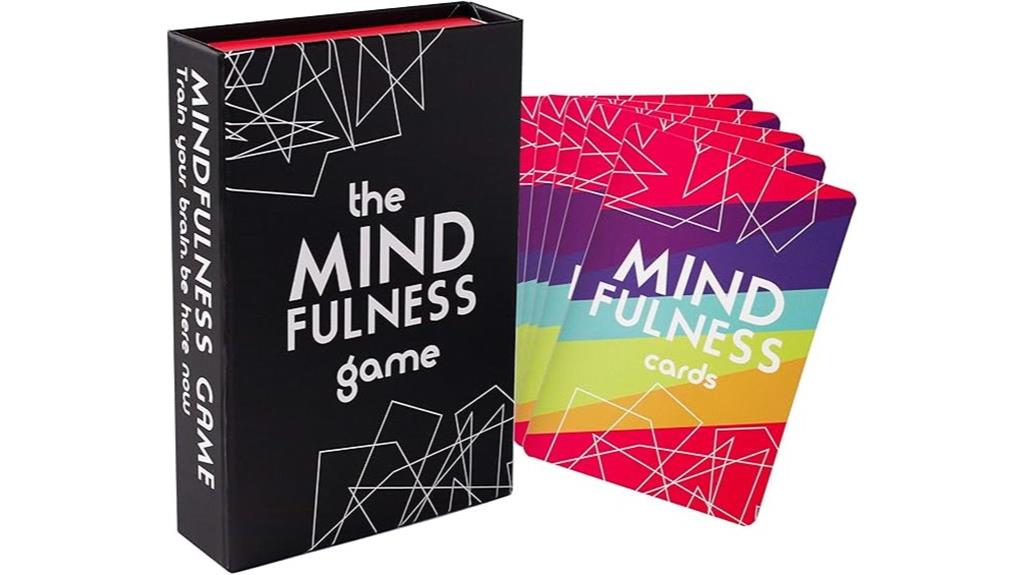
Mindfulness Card Games stand out as an excellent tool for therapists, teachers, and families seeking engaging activities that promote calmness and social skills across all ages. These games are designed to teach mindfulness, improve social interactions, and support self-care for kids, teens, and adults. They feature 40 sturdy, therapy-friendly cards that encourage grounding, focus, and relaxation through interactive gameplay. Created by InnerIcons, a socially conscious company, they also include a helpful booklet with instructions and extension activities. Whether used in group therapy, individual sessions, or at home, these games foster inquisitiveness, calmness, and mental well-being, making mindfulness accessible and fun for everyone.
Best For: therapists, counselors, and families seeking engaging, therapeutic activities to promote mindfulness, social skills, and emotional regulation for children, teens, and adults.
Pros:
- Durable, large cards with a clean, therapy-friendly design suitable for professional and personal use
- Includes a helpful booklet with clear instructions and extension activities to reinforce mindfulness concepts
- Engages users in active, fun gameplay that fosters inquisitiveness and social skill development
Cons:
- May require facilitator guidance for optimal use, especially with younger children or group settings
- Limited to 40 cards, which might not cover all specific therapeutic needs or topics
- Some users might find the game format less suitable for highly structured or clinical interventions
The School of Mindfulness: Mindfulness Game for Kids
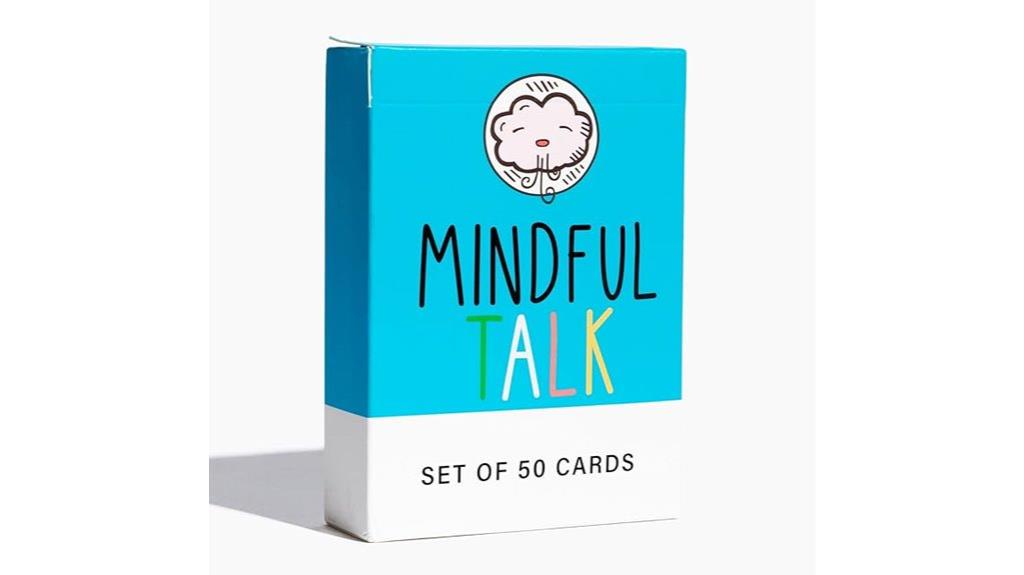
If you’re looking for a way to help children build emotional awareness and practice mindfulness, The School of Mindfulness game is an excellent choice. It includes 50 question cards designed to spark meaningful conversations between kids and parents. The game’s simple, versatile format encourages self-reflection, emotional understanding, and open dialogue. Divided into categories like Mindfulness, Emotion, Inquiry, and Expression, it helps kids age 8 and up explore their feelings in a fun, engaging way. Suitable for small groups or family time, it promotes connection and emotional literacy while being easy to carry and quick to learn. It’s a practical tool for nurturing mindfulness in children.
Best For: parents, teachers, and counselors seeking an engaging, easy-to-use tool to foster emotional awareness and mindfulness in children aged 8 and up.
Pros:
- Promotes meaningful conversations and emotional literacy in a fun, interactive way
- Versatile for use in family, therapy, or casual settings such as car rides and meals
- Compact and portable design makes it easy to carry and quick to learn
Cons:
- May be less suitable for children under 8 due to complexity of some questions
- Limited to 50 questions, which might require supplementing with additional activities for long-term engagement
- Requires adult facilitation for best results, especially with younger children
Mindfulness Therapy Card Game for All Ages

The Mindfulness Therapy Card Game by Arcia stands out as an excellent choice for all ages, from children to adults, because it’s designed to be engaging and accessible for everyone. I love how it combines fun with essential life skills like self-care, emotional regulation, and mindfulness. With 50 durable, colorful cards, it’s perfect for therapy, classrooms, or family nights. The game promotes grounding, focus, and calmness while supporting mental health and anxiety reduction. Its simple setup and versatile content make it easy to adapt for any group or individual, making mindfulness practice approachable and effective for people of all ages.
Best For: individuals of all ages seeking to improve emotional regulation, mindfulness, and social skills through an engaging, versatile therapy tool.
Pros:
- Suitable for a wide age range, from children to adults, making it versatile for many settings.
- Durable, high-quality cards designed for long-term use and repeated play.
- Easy to set up and adapt for individual or group activities, enhancing accessibility and engagement.
Cons:
- Some users may find the card content too simple for advanced learners.
- Limited digital or online components for remote or virtual sessions.
- The physical cards require storage space and careful handling to maintain their condition.
Mind Brain Emotion 52 Essential Coping Skills for Kids

Designed for children aged 5 to 15, Mind Brain Emotion’s set of 52 coping skills cards is an excellent tool for parents, teachers, and mental health professionals seeking engaging ways to support kids’ emotional development. These award-winning cards promote mental strength, emotional regulation, and social skills through fun activities, play therapy, and practical strategies. Developed by Dr. Jenny Woo and The Woo Crew, they help children manage stress, anxiety, anger, and fear. With over 50 exercises, videos, and assessments, the set encourages calming techniques, self-awareness, and resilience—making it a versatile resource for therapy, classroom, or home use to nurture emotional intelligence in kids.
Best For: parents, teachers, and mental health professionals seeking an engaging, versatile tool to support children’s emotional regulation, resilience, and social skills from ages 5 to 15.
Pros:
- Contains over 50 practical, fun exercises and activities that promote emotional intelligence and coping skills.
- Versatile use as flashcards, conversation starters, therapy toys, or classroom materials, suitable for home, school, or therapy settings.
- Includes videos and online assessments to enhance engagement and track progress over time.
Cons:
- Cards are thinner than standard playing cards and may wear out faster with frequent use.
- Some users may find the set’s physical design less durable for very active children.
- The initial setup or integration into routines may require some guidance for optimal effectiveness.
100 Mindfulness Conversation Starter Cards for Kids

Mindfulness Conversation Starter Cards for Kids are an excellent choice for parents, teachers, and child therapists seeking an engaging way to promote emotional awareness and communication. These sturdy, portable cards feature 100 prompts across categories like emotions, gratitude, focus, and mindfulness, encouraging kids to reflect and share their feelings. Designed for children aged 8 and up, they foster deeper connections during family dinners, therapy sessions, or classroom activities. Many users praise their ease of use and ability to spark meaningful conversations, helping reluctant talkers open up and build emotional intelligence. Overall, they’re a versatile tool to nurture mindfulness, resilience, and self-awareness in children.
Best For: parents, teachers, and child therapists seeking to foster emotional awareness and meaningful communication with children aged 8 and up.
Pros:
- Encourages self-reflection, emotional intelligence, and mindfulness in children
- Durable, portable design makes it easy to use at home, in the classroom, or during therapy sessions
- Facilitates deeper connections and conversations, especially with reluctant talkers
Cons:
- Occasional typos or repeated prompts may affect the seamless experience
- Some users perceive the quality as rushed or lower than expected
- Limited variety in prompts might require supplementing with additional discussion tools
Mindfulness Matters Game to Improve Coping Skills

If you’re looking for a practical tool to help teens and adults develop better coping skills, the Mindfulness Matters Game stands out as an engaging and effective option. Developed by a therapist, it features 78 cards with practical mindfulness strategies and role-playing activities designed to teach stress, anger, and worry management. The game encourages cooperation and social skills, making it ideal for therapy or group settings. It’s quick to play—about 15-25 minutes—and adaptable for different ages and environments. Many users find it enjoyable and a meaningful way to build resilience while increasing focus through fun, hands-on learning.
Best For: therapists, educators, and families seeking an engaging, practical tool to teach mindfulness and coping skills to teens and adults in group or individual settings.
Pros:
- Promotes social skills and cooperation through fun, interactive gameplay
- Teaches practical, real-life mindfulness strategies adaptable for various ages and environments
- Compact and easy to incorporate into therapy or educational routines
Cons:
- May require some modification for very young children under age 9
- Limited to 78 cards, which might necessitate supplementing with additional activities for prolonged use
- Some users may find the role-playing activities less engaging without facilitator guidance
Mindfulness Therapy Card Game for Kids, Teens & Adults
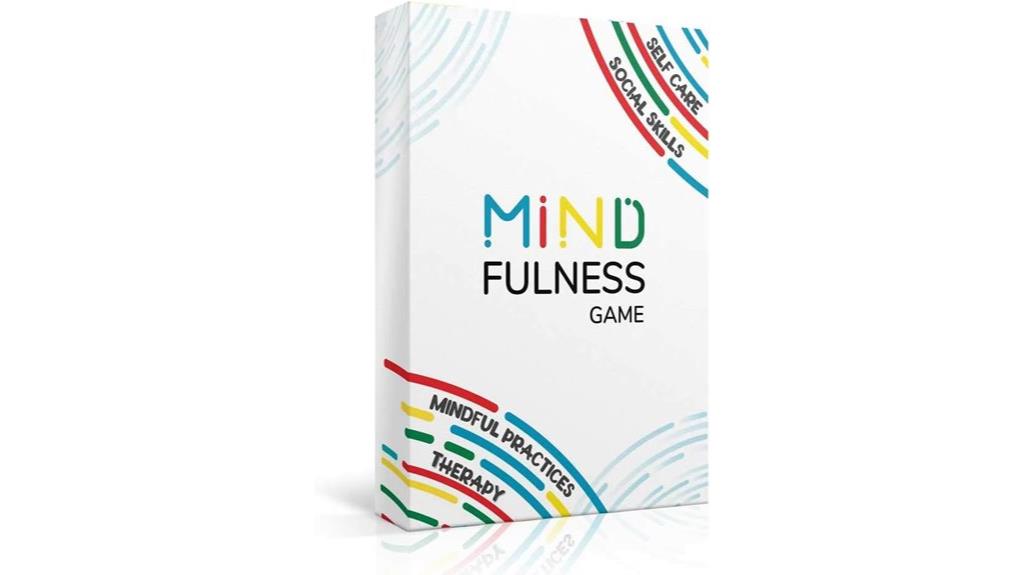
The Mindfulness Therapy Card Game by Arcia stands out as an excellent choice for families, educators, and therapists seeking a versatile tool that engages kids, teens, and adults alike. It’s crafted to teach social skills, mindfulness, self-care, and emotional regulation through 50 durable, visually appealing cards. Designed for group play, it supports mental health, reduces anxiety, and builds self-esteem in various settings, including therapy, classrooms, and family nights. Created by professionals with over 25 years of experience, this game makes learning essential life skills engaging and fun, fostering calmness, focus, and resilience across all ages.
Best For: families, educators, and therapists seeking an engaging, versatile tool to teach mindfulness, social skills, and emotional regulation to kids, teens, and adults in various settings.
Pros:
- Durable, high-quality cards with engaging visuals suitable for all ages
- Supports a wide range of techniques including mindfulness, social skills, and self-care
- Easy to set up and modify, making it adaptable for therapy, classroom, or family use
Cons:
- Some users find the cards’ simplicity may require additional guidance for deeper learning
- The compact size may limit detailed content or complex exercises on each card
- Being made in China, some may prefer locally produced alternatives for sustainability reasons
Allura & Arcia 52 Mindfulness Cards
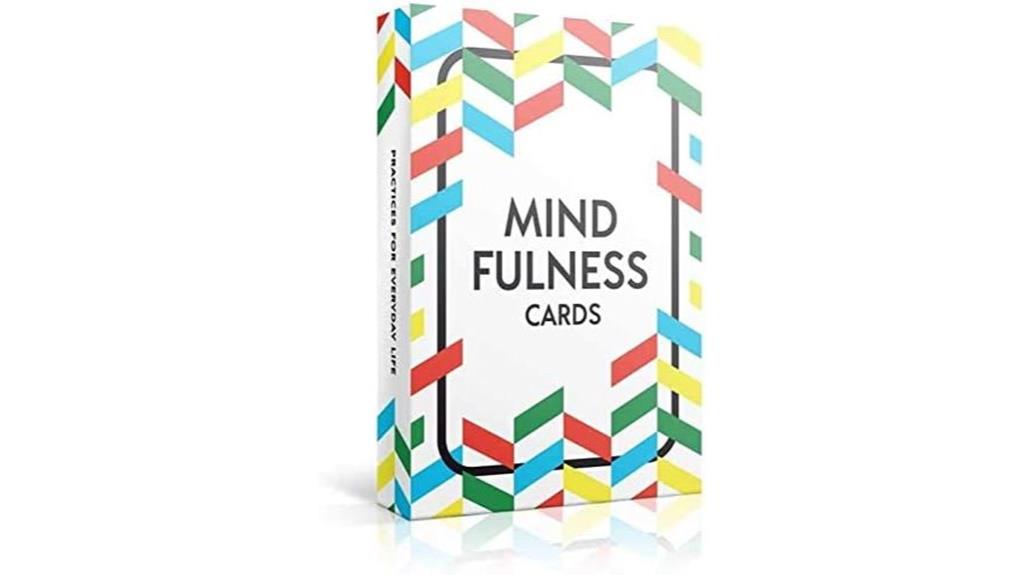
For anyone seeking a versatile and easy-to-use tool to enhance mental wellness, Allura & Arcia 52 Mindfulness Cards are an excellent choice. Designed by experts with over 25 years of experience, these cards feature 52 exercises targeting stress relief, anxiety reduction, meditation, and self-care. They’re divided into five categories, including Creating Balance and Developing Insight, providing a well-rounded approach to mindfulness. Made from durable materials and large enough for daily use, these cards are perfect for individuals of all ages, therapists, or as thoughtful gifts. They help improve focus, emotional regulation, and social skills, making mindfulness accessible and practical in everyday life.
Best For: individuals of all ages, therapists, and anyone seeking an accessible, effective tool for stress relief, mindfulness, and emotional well-being.
Pros:
- Includes 52 professionally designed exercises suitable for various settings and age groups
- Durable, large cards that are easy to handle and incorporate into daily routines
- Versatile categories promoting comprehensive mental health benefits like balance, insight, and compassion
Cons:
- May require prior familiarity with mindfulness techniques for optimal use
- Limited to the exercises provided; some users might prefer more personalized or interactive tools
- Not a substitute for professional therapy but best used as a complementary resource
Allura & Arcia 52 Stress Less & Self Care Cards

Looking for a practical tool to manage stress and boost mindfulness across all ages? The Allura & Arcia 52 Stress Less & Self Care Cards are perfect. These portable, travel-sized cards feature 52 exercises focused on mindfulness, breathing, visualization, and positive affirmations. Developed by professionals, they help reduce anxiety and automatic stress responses whether you’re at work, school, or home. Suitable for kids, teens, and adults, each card offers quick, easy-to-memorize activities that promote relaxation and emotional resilience. Their attractive designs and durable quality make them engaging tools to incorporate into daily routines, therapy sessions, or as thoughtful gifts for anyone seeking calm and self-care.
Best For: individuals of all ages seeking quick, effective tools to manage stress, enhance mindfulness, and promote relaxation in various settings such as home, school, work, or therapy.
Pros:
- Portable and lightweight, easy to carry anywhere for instant stress relief.
- Developed by professionals, ensuring exercises are safe, effective, and easy to understand.
- Suitable for a wide age range, including kids, teens, and adults, making it versatile for families and professionals.
Cons:
- Some users have experienced minor issues like torn packaging or printing errors.
- The small size of the cards may be less suitable for those with visual impairments.
- As a deck of cards, it may require additional guidance for some users unfamiliar with mindfulness practices.
100 Mindful Days: Daily Self-Care & Gratitude Activity Cards
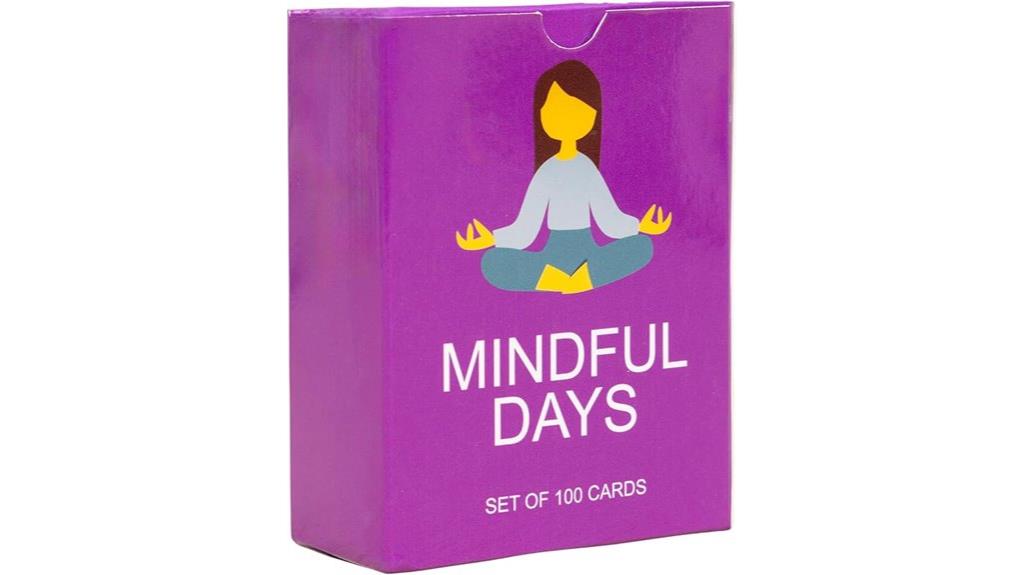
If you’re seeking a simple, portable way to incorporate mindfulness into your daily routine, Mindful Days activity cards are an excellent choice. These compact cards feature 100 inspiring prompts designed to promote self-care, gratitude, and emotional awareness. Made from eco-conscious, durable materials, they’re perfect for on-the-go moments—whether at home, work, or school. Each prompt takes just a few minutes, making it easy to build a daily mindfulness habit without long meditations. The cards are suitable for all ages, especially teens and adults, and help reduce stress, improve focus, and foster positivity. Their sleek design and practical size make them a valuable tool for everyday mindfulness practice.
Best For: individuals of all ages seeking quick, accessible mindfulness, self-care, and gratitude practices to incorporate into their daily routines.
Pros:
- Portable and lightweight, making it easy to carry and use anywhere.
- Simple, clear prompts suitable for beginners and experienced mindfulness practitioners alike.
- Durable, eco-conscious materials ensure long-lasting use and sustainability.
Cons:
- Limited to short activities, which may not satisfy those seeking in-depth meditation practices.
- Some users might find the prompts too generic or repetitive over time.
- Not suitable for children under 12 without adult guidance, as the cards are recommended for ages 12 and up.
Shined Mind: Mindfulness Card Game for Anxiety Relief
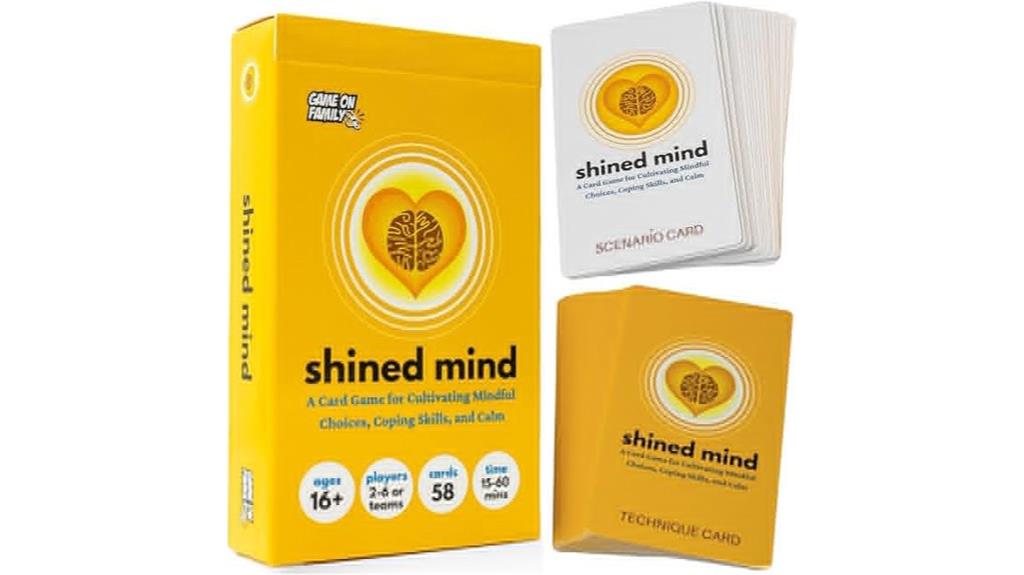
Shined Mind stands out as an excellent mindfulness card game for teens and adults seeking practical tools to manage anxiety and build emotional resilience. Created by a woman-owned brand and used by professionals, it offers 58 high-quality cards with real-life emotional scenarios paired with easy-to-understand mindfulness techniques. Designed for solo or group play, the game promotes self-awareness, emotional regulation, and calmness, making it a versatile resource for classrooms, therapy sessions, or at home. While some find it lengthy or wordy, its focus on relatable situations and coping strategies makes it a valuable tool for fostering emotional wellness and resilience.
Best For: teens, adults, and professionals seeking practical tools to manage anxiety, build emotional resilience, and promote mindfulness in solo or group settings.
Pros:
- Contains 58 high-quality, relatable cards with practical mindfulness techniques.
- Versatile for use in classrooms, therapy, or at home to promote emotional regulation.
- Created by a woman-owned brand and used by professionals, ensuring credibility and effectiveness.
Cons:
- Some users find the game lengthy or wordy, which may reduce engagement for younger or ADHD-affected teens.
- It can feel less fun as a traditional game, focusing more on discussion and reflection.
- The size and weight (4.75 x 2.75 inches, 6.7 ounces) may be less portable for frequent use on the go.
Factors to Consider When Choosing Mindfulness Card Games

When choosing a mindfulness card game, I consider factors like age appropriateness and how relevant the content is to the user. I also look at how engaging and visually appealing the game is, along with its portability and size for easy use on the go. These elements help guarantee the game fits well with the player’s needs and lifestyle.
Age Appropriateness
Choosing the right mindfulness card game requires paying close attention to age appropriateness to guarantee it resonates with the user’s developmental level. Making sure the recommended age range matches the user helps promote engagement and understanding. Consider whether the language and imagery are suitable for their age—simple prompts work well for young children, while more complex topics suit teens and adults. Look for content that addresses their specific emotional and cognitive needs, like social skills for kids or stress relief for grown-ups. It’s also important to verify that the game’s design and complexity match their mental abilities to prevent frustration or boredom. Selecting age-appropriate themes and activities ensures the experience is meaningful and supports their emotional growth at every stage.
Content Relevance
Given the importance of aligning content with the user’s needs, I always consider whether the themes and exercises in a mindfulness card game support specific goals like stress reduction, emotional regulation, or self-awareness. I check if the content matches the user’s age and developmental level to guarantee engagement and effectiveness. It’s also essential that the language is clear, concise, and accessible, so practicing doesn’t become confusing or overwhelming. I look for evidence-based techniques such as breathing exercises, positive affirmations, or reflection prompts to add credibility. Additionally, I consider whether the content resonates with the user’s cultural background and personal preferences, making the practice more relevant and meaningful. This careful evaluation helps make sure the game genuinely supports mindfulness goals and suits individual needs.
Engagement Level
Selecting a mindfulness card game that truly engages users involves more than just appealing content; it requires a careful look at how the game captures and sustains attention. An engaging game uses interactive activities, colorful designs, and relatable content to keep players involved. Short, concise prompts help maintain interest without overwhelming, encouraging ongoing participation. Incorporating varied categories and dynamic gameplay elements motivates users to explore different mindfulness techniques repeatedly. Meaningful visuals and tactile components also enhance sensory engagement, making the experience more immersive and memorable. Regularly updating prompts prevents boredom and fosters long-term commitment. Ultimately, a high engagement level ensures that players remain interested, making mindfulness practices more enjoyable and sustainable over time.
Visual Appeal
Visual appeal plays a crucial role in making mindfulness card games inviting and effective. Attractive, well-designed cards draw you in and encourage regular use. Clear, minimalistic graphics can promote calmness and help focus during practice. Bright colors and easy-to-read typography enhance visibility, especially for those with visual or cognitive challenges. When cards look appealing, you’re more likely to display or carry them around, reinforcing mindfulness habits. High-quality, aesthetically pleasing designs also make these cards perfect as thoughtful gifts or decorative items. Overall, the visual elements not only support the calming purpose of the game but also make the experience more enjoyable and engaging, increasing the likelihood of consistent mindfulness practice.
Portability & Size
Choosing a mindfulness card game that’s portable starts with paying attention to its size and weight, guaranteeing it fits easily into your daily routine. Look for cards that are compact, ideally around 3.5 by 2.5 inches, similar to standard playing cards, making them easy to carry in pockets or bags. Opt for lightweight designs—under 8 ounces—to prevent any burden during your day-to-day activities. Check if the cards come in a sturdy, compact box or case that protects them without adding unnecessary bulk. A durable package ensures your game stays intact and ready to go whenever you need a quick mindfulness break. Prioritizing size and weight helps you seamlessly incorporate mindfulness practice into your busy schedule.
Durability & Quality
Making sure your mindfulness card game lasts through daily use is just as important as its portability. High-quality sets are crafted from durable materials like thick cardstock or laminated surfaces that can handle frequent handling without falling apart. Clear design and crisp graphics, along with legible text, prevent wear that could obscure important instructions or prompts over time. Well-constructed cards often feature rounded or reinforced edges, reducing fraying and tearing during regular use. The overall craftsmanship, including sturdy box packaging and secure stacking, contributes considerably to the set’s longevity. Customer reviews support this, often praising how well-made sets maintain their condition even after consistent practice. Investing in durability ensures your mindfulness journey remains uninterrupted and enjoyable over the long term.
Frequently Asked Questions
Are Mindfulness Card Games Suitable for All Age Groups?
You’re wondering if mindfulness card games suit all ages. I believe they can be very adaptable, making them suitable for kids, teens, adults, and seniors. I’ve seen these games help everyone improve focus, reduce stress, and stay present. Of course, choosing age-appropriate themes and language is key. Overall, I think with some adjustments, mindfulness card games are a versatile tool for promoting calm and awareness across all age groups.
How Often Should I Use Mindfulness Card Games for Best Results?
I recommend using mindfulness card games daily or at least a few times a week for the best results. Consistency helps reinforce relaxation and present-moment awareness. I personally find that integrating them into my routine, like mornings or before bed, keeps me grounded and reduces stress. However, listen to your body—if daily feels overwhelming, start with a few times a week and adjust as you go.
Can Mindfulness Card Games Replace Professional Therapy?
You’re wondering if mindfulness card games can replace professional therapy. I’d say they’re a helpful supplement, but not a substitute. While these games can improve relaxation and awareness, they don’t address deep-rooted issues or provide personalized guidance that a trained therapist offers. If you’re struggling with serious mental health concerns, I recommend seeking professional help alongside using mindfulness tools. Your well-being deserves extensive support.
What Materials Are Used in Making These Mindfulness Cards?
You’re curious about what materials are used in making mindfulness cards. I’ve found that most cards are made from sturdy cardstock or thick paper, ensuring durability. The artwork often features calming colors and images printed with eco-friendly inks. Some cards have laminated surfaces for extra protection, making them feel smooth and pleasant to touch. Overall, manufacturers focus on quality materials that promote a calming experience and withstand regular use.
Are There Specific Cards Focusing on Grief or Trauma?
Yes, some mindfulness card decks focus specifically on grief and trauma. I’ve seen cards designed to gently guide you through processing difficult emotions, offering compassionate prompts and grounding exercises. These decks aim to create a safe space for reflection and healing. If you’re dealing with grief or trauma, I recommend exploring these specialized cards—they can be a helpful tool to support your journey towards acceptance and peace.
Conclusion
Choosing the right mindfulness card game is like finding a peaceful oasis in a busy city—you want serenity, but also engagement. Whether it’s a deck for stress relief or daily self-care, each offers a unique retreat from chaos. So, don’t just pick any card, pick the one that invites you to pause, breathe, and truly be present. After all, sometimes the simplest tools can bring the deepest calm.
